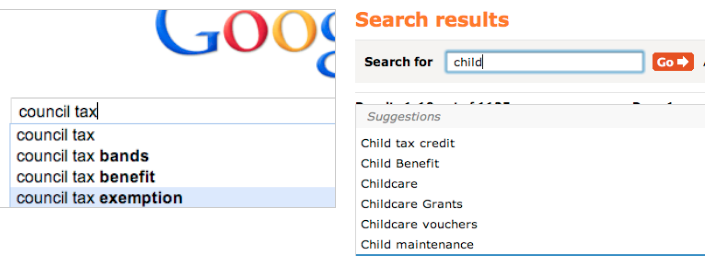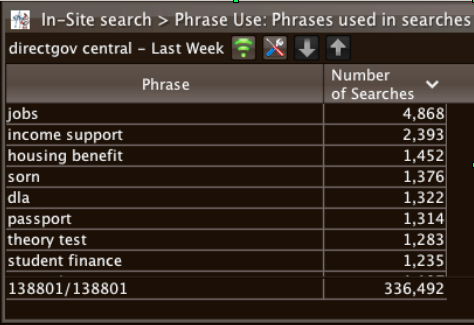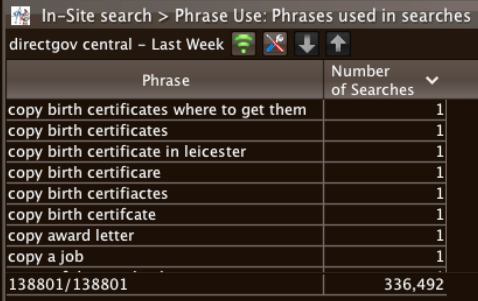As a Product Analyst in the GDS Delivery team acquiring data is critical for telling us if our products are meeting user needs and how improvements must be made to content and services. Our team analyses not only search data but data from comments left on pages, feedback to our helpdesk and customer surveys.
Search data
One of the best data sources comes from collating what users search for - whether it’s a search on Google or Bing, or a phrase typed into a site search box. This provides direct insight into users’ needs and an opportunity to identify intent.

As well as being high volume and current, search data is also unfiltered: it includes misspellings, colloquialisms and outdated terminology. Users do not always speak the same language as Government, so knowing what people actually search for means we can make sure people get relevant results even with the “wrong” search term. On Directgov when a user searches for license they will get results for licence and the term ‘unemployment benefit’ returns Jobseekers’ Allowance.
There are over 300,000 searches carried out weekly on Directgov, with over 125,000 different search phrases. The most popular term, ‘jobs’, is searched for 4,500 times a week.At the other end of the spectrum there is a ‘long tail’ of 100,000 phrases that are only searched for once.


Using this data to identify needs that are not being met by government can be daunting. However, it is possible to filter or group it to pick out emerging trends and unsatisfactory user journeys.
How search data influences content
During periods when the UK is affected by heavy snow, perhaps the obvious response is to focus on information about the weather and disruption to the transport system and roads. But an analysis of what people were searching for on Directgov (and the web) during one of these periods showed a big rise in searches for ‘school closures’. Responding to this, Directgov made school closure information much more prominent and worked with colleagues in local authorities to collate links through the local Directgov system.
Other occasions when users’ chosen search phrases have informed content include Budget day, when we have seen non-government terms used; from perhaps predictable ones like ‘IHT’ and ‘PA’ (Inheritance Tax and Personal Allowance) through to phrases that proved popular like '10p tax' and 'scrappage' (the removal of the 10% starting rate of tax and the vehicle discount scheme respectively). These last two are examples where a snappier, easier to understand expression replaces the official government terminology (albeit sometimes helped along by the media).
During the run up to a recent Christmas, a growing volume of searches that included the words ‘Christmas’ and ‘payment’ was spotted. We also noted that users were not clicking on the (irrelevant) results presented to them. Delving deeper, we were able to see what else those users looked for. This identified an unmet user need: benefit payment dates over the Christmas period. HMRC published an article on Directgov and, as we were able to supply the relevant keywords that users were searching for, the search engine-optimised article ranked well in Google quickly.
In addition to sudden spikes or trends, analysis over longer periods of time shows trends through the year or within a month. Searches relating to ‘renewing car tax’ peak towards the end of the month. These search terms vary hugely, and include ‘car tax’, ‘road tax’, ‘tax disc’, ‘taxdisc’, as well as the official ‘vehicle excise duty’ and other smaller volume phrases like ‘tax a vehicle’ and ‘check if car is taxed’. There are also predictable seasonal needs, and it’s important to make sure that – for example - when summer arrives, information on office temperature regulations is available, alongside current bank holiday dates and how to renew a passport urgently.
Search data and GOV.UK
When GDS began sketching out first alpha.gov.uk and then the GOV.UK beta, search data was a key driver in the process of gathering user needs. The key question was “were people looking for it and what were they calling it?”
Directgov analyses search data the following day but with the beta of GOV.UK we will be reviewing search terms and landing pages even more closely.
Analytics tools are embedded deep into the technology stack of the GOV.UK beta providing real-time analysis of how individual pages are performing. Applying a set of metrics to the different content formats on GOV.UK acknowledges that users deal with different types of content in varying ways. What we are calling a ‘quick answer’, ie a single page article dealing with a relatively simple subject, will be measured differently to a complicated multi-chapter guide.
One of the cornerstones of the beta of GOV.UK is the use of evidence from analytics and insight to identify and meet user needs as they evolve. Our use of analytics puts users at the centre of how we make changes and improvements.


5 comments
Comment by SEO for GOV.UK | Government Digital Service posted on
[...] also shaped our user needs with search data right from the beginning and done a lot of keyword research along the way to really get into the [...]
Comment by Bank Holiday story – is it really simpler, clearer, faster? | Government Digital Service posted on
[...] We already have data from many existing sources, such as usage from existing sites, A/B testing, search data and user [...]
Comment by Chris Jones (@MyFavouriteCake) posted on
Seasonal search rankings and event based ranking was something we looked to do at one stage. But at the time we didn't have enough resource / time to develop or implement.
But it's something that can dramatically improve customer experience (if implemented correctly.)
Will be interesting to see if/how you will implement this.
Comment by Introducing the beta of GOV.UK | Government Digital Service posted on
[...] people have of Government (broadly, those currently catered for by Directgov) - making them as findable, understandable and actionable as we can. We’ve built a scalable, modular open source technology [...]
Comment by כן, חיפוש! | פירורי לחם – יוסף ויסמן posted on
[...] שהתפרסם בבלוג של השירות הדיגיטלי של ממשלת בריטניה – Using search data to meet user needs – העוסק בדרך שבה משמשים ביטויי החיפוש של משתמשי [...]